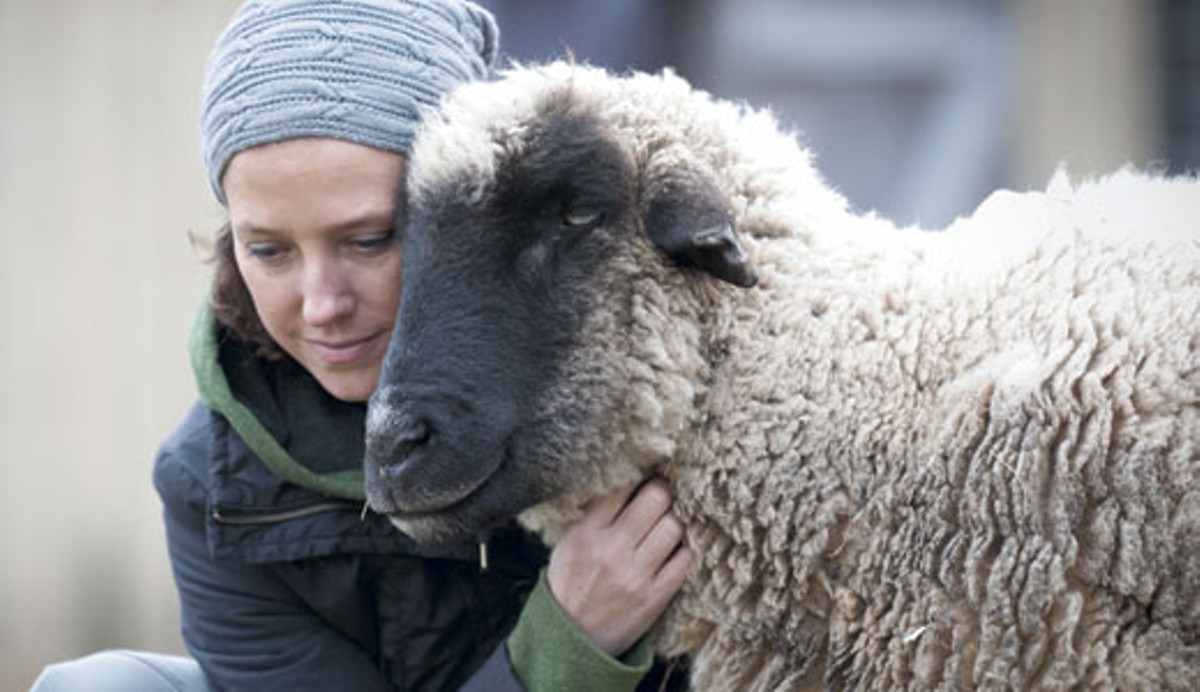Jenny Brown’s right leg left Kentucky before she did, as she writes in her rousing, wrenching memoir about a childhood battle with bone cancer, her path to veganism and animal rights activism, making undercover films for PETA, and founding the Woodstock Farm Animal Sanctuary in upstate New York.
The author, who set out to write a polemic against animal abuse, was served well by those who advised her to weave candid details from her life into “The Lucky Ones: My Passionate Fight for Farm Animals.” Though she pulls no punches where meat and dairy consumption are concerned, even the staunchest fast-food fanatic will find it tricky to root against Brown’s irrepressible spirit and crusade.
Brown tempers the heartbreak of her medical past with endearing, often hilarious moments. In one episode, after having fought her way onto the cheerleading squad, she turns a cartwheel during a key game stoppage. Unfortunately, the momentum of her running start causes her prosthetic to disconnect from her body, sending the leg soaring, end-over-end, and landing at center court with an “inelegant CLUNK.”
The image of Brown skittering off to the locker room on her backside with “Eye of the Tiger” playing is stunningly absurd. But Brown quickly discovered the humor, turning the story into something to laugh about with her squad.
By ninth grade, she was feeling like a normal teenager: a sense that must have faded when she began experimenting with a meatless diet. Back then, Brown writes, Louisville was a “lonely place to be a vegetarian.”
Describing her days as a U of L student, the former McDonald’s employee smartly uses the pill analogy from “The Matrix” to help explain her conversion, as well as the resistance of some friends to see things her way. The blue pill returns us to our normal routine, she explains, while the red shows us what’s hidden under the façade of nutritional pyramids, USDA labels, healthful looking ad campaigns, and so many other insidiously normal aspects of our lives.
LEO had a chance to ask Brown about taking the red pill, the farm animal sanctuary she founded in Woodstock with husband Doug, and her new book, which she was in town promoting at Carmichael’s Bookstore.
LEO: You write a lot about “ethical eating.” Can a meat eater be an ethical eater?
Jenny Brown: To me, you’ve got to take ‘ethical’ out of that. It’s not ethical to eat animals when we have no nutritional need to consume them. Please know, I am an animal rights activist and I’m a realist, too. But, there’s so many fallacies. If you knew what a cliché it was, on my ears, when people say, ‘Well, where do you get your protein?’ What is the protein deficiency disease in this country? Oh, you can’t name it? If you’re getting enough food to eat, you’re getting enough protein. And, as long as we eat meat, factory farms will prevail. It’s not a matter of going local or supporting meat you think is sustainable. We’re still taking the life of an animal for the trivial sake of pleasure. For me, I’ve got a problem with that.
LEO: There’s been a shift by some vegans from an almost prosecutorial place to a softer, more focused approach. There’s been degrees of change. You say you’re a realist, well, you’re not going to convince certain people away from what they consider their rightful place on the food chain. But you might get them to do a Meatless Monday twice a month.
JB: Yes, or “Vegan Before Six,” like Mark Bittman says, The New York Times food columnist. Incremental change is fine. But I’d rather my voice and mission be for empty cages rather than bigger cages. Our organization doesn’t put any effort into promoting small, “sustainable farms.” I read your article about the pig farmer and I appreciate that they’re doing it on a smaller scale. There is more of a connection there, like with hunters who don’t blindly buy packaged meat from a supermarket. But I could never take the life of an animal. Most people couldn’t. We’d rather it be an invisible system. ‘Oh, I can’t look at the (slaughterhouse) videos!’ But you are responsible for it. Are you living your values when you say you’re against cruelty to animals? Do you love all animals, or are you excluding the majority, the 10 billion in this country that die every year for human consumption?
LEO: Your “Matrix” analogy is about losing more than just our appetite for hamburger, isn’t it? Why do more people not take the “red pill”?
JB: It’s our indoctrination from a very early age. Children naturally love and gravitate toward animals. But many people don’t tell their children that hamburgers come from cows. They try to block that conversation because they don’t have a good argument for it. There is such a lack of awareness. They never talk about how humans aren’t made to drink cow’s milk, how we’re the only species that drinks milk after weaning, and the only that drink the milk of another species. By the way, cows don’t give milk. You artificially inseminate them, steal their calves with their heartbreaking bellows so that you can drink the breast milk of another animal. We don’t think critically in this country. The meat and dairy lobbies are huge on Capitol Hill. All these subsidies that go to them, and these clever ad campaigns with the milk mustaches, we’re being lied to. Milk depletes calcium from bones. I can’t fault people. I grew up not making these important connections. That is the unique opportunity of places like the Woodstock Farm Animal Sanctuary. The animals are tangible, not abstract. We make the invisible visible.






